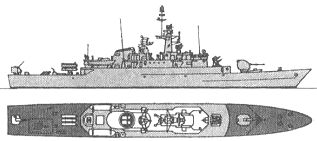

Saam 1975

Alvand 2010
| Name | No | Yard No | Builder | Laid down | Launched | Comp | Fate |
| سام [Saam], 1985- الوند [Alvand] | DE12, 1976- 71 | Vosper Thornycroft, Woolston, UK | 22.5.1967 | 25.7.1968 | 20.5.1971 | in service (2019) | |
| زال [Zaal], 1985- البرز [Alborz] | DE14, 1976- 72 | Vickers, Barrow, UK | 3.3.1968 | 4.3.1969 | 1.3.1971 | in service (2019) | |
| رستم [Rostam], 1985- سبلان [Sabalan] | DE16, 1976- 73 | Vickers, Newcastle & Barrow, UK | 10.12.1967 | 4.3.1969 | 6/1972 | in service (2019) | |
| فرامرز [Faramarz], 1985- سهند [Sahand] | DE18, 1976- 74 | Vosper Thornycroft, Woolston, UK | 25.7.1968 | 30.7.1969 | 28.2.1972 | sunk 18.4.1988 |
|
Displacement standard, t |
1250 |
|
Displacement full, t |
1540 |
|
Length, m |
88.4 pp 94.5 oa |
|
Breadth, m |
11.1 |
|
Draught, m |
3.25 |
|
No of shafts |
2 |
|
Machinery |
CODOG: 2 Rolls-Royce Olympus TM3A gas turbines / 2 Paxman 16YJCM diesels |
|
Power, h. p. |
46000 / 3800 |
|
Max speed, kts |
39 |
|
Fuel, t |
diesel oil 150 |
|
Endurance, nm(kts) |
5000(15) |
|
Armament |
DE12, 14: 1 x 5 Sea Killer SSM (5 Sea Killer), 1 x 3 Sea Cat GWS22 SAM (9 Sea Cat), 1 x 1 - 114/45 Mk 5, 1 x 2 - 35/90 GDM-A, 1 x 3 - 305 Limbo Mk 10 ASWRL DE16, 18: 1 x 5 Sea Killer SSM (5 Sea Killer), 1 x 3 Sea Cat GWS22 SAM (9 Sea Cat), 1 x 1 - 114/55 Mk 8, 1 x 2 - 35/90 GDM-A, 1 x 3 - 305 Limbo Mk 10 ASWRL |
|
Electronic equipment |
AWS-1, 2x Sea Hunter RTN-10X radars, type 170, type 174 sonars, RDL-2AC ECM suite |
|
Complement |
135 |
Project history: It was announced an 25 August 1966 that Vosper Ltd, Portsmouth, received an Iranian order for four 'destroyers'. Three factors made the design possible. The first was the development of the Olympus marine gas turbine with a rating in excess of 22500hp - a great advance on the AEI G6 turbine (7500shp) fitted in the British 'County' and 'Tribal' classes. This made it possible for the gas turbine to become the main source of power instead of merely a boost turbine used in conjunction with conventional steam turbines. Diesel engines for cruising could therefore be added in a CODOG arrangement which considerably simplified gearing. The second factor was the advent of a new generation of smaller and lighter but more powerful weapons systems that did not require such a large ship to carry them. The third factor was the reduced crew needed not only thanks to gas turbines and the higher degree of weapon automation but also to the increased reliability accruing from each of these developments and the consequent reduction in maintenance. Unit replacement methods associated with both gas turbines and modem electronics would ensure faster repairs than mold haw previously been possible.
As the Mk 5 'destroyer' project which gave birth to the Saam class was a private design, the Vosper designers were able to reduce weight and cost which at £6.5m was about two-thirds the price of similarly equipped vessels built to the standards demanded by Western navies - by a careful consideration of how far these standards were applicable to the role envisaged for these particular ships. They considered that the standards of shock-resistance laid down by the Admiralty were unnecessarily high, being based on the high probability of near-misses for an older, and less accurate, generation of weapons. Savings were also made by lowering the standards of engine mountings considered essential to reduce underwater noise in a vessel whose primary function was ASW. As a defence against submarine attack the class was to rely on high speed and the manoeuvrability bestowed on them by their KaMeWa CP propellers. Air-conditioned throughout. Retractable Vosper fin stabilizers. Hull-mounted sonar at high speeds retracts into the hull and is covered by doors to protect it against excessive pressures. All weapons and sensors are integrated in a computerized operations room, and all machinery is operated from a similar centralized control room with full instrumentation.
Modernizations: 1977, Saam, Zaal: - 1 x 1 - 114/45; + 1 x 1 - 114/55 Mk 8
1988, all: - 1 x 3 Sea Cat SAM; + 1 x 2 - 23/87 ZU-23-2
1990, all survived: - 1 x 2 - 23/87; + 3 x 1 - 20/90 GAM-B01
1996-1998, all survived: - 1 x 5 Sea Killer SSM; + 2 x 2 C-802 SSM (4 C-802), type 352C, Decca 1226 radars
2001, Alvand, Alborz: - 1 x 3 - 305 Limbo Mk 10 ASWRL; 2 x 3 - 324 Mk 32 TT
Naval service: Sahand was sunk 19.4.1988 by three Harpoons from USN destroyer Joseph Strauss and cluster bombs from aircraft based on USN nuclear aircraft carrier Enterprise. At the same time Sabalan was badly damaged, with her back broken by a laser guided bomb, but was repaired and became again operational in 1991.

Rostam 1978

Alvand 2002
© Ivan Gogin, 2019